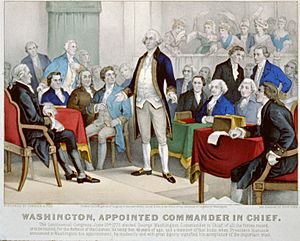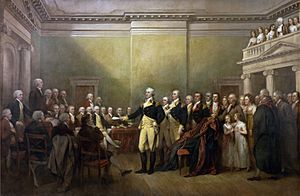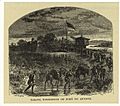George Washington in the American Revolution facts for kids
Quick facts for kids
George Washington in the American Revolution
|
|
|---|---|

Currier and Ives depiction of Washington accepting his Continental Army commission from the Second Continental Congress
|
|
| Born | February 22, 1732 |
| Died | December 14, 1799 (aged 67) |
| Service/ |
Continental Army |
| Years of service | 1775–1783 |
| Rank | General & Commander in chief |
| Commands held | Main Army |
| Battles/wars | Boston campaign
New York and New Jersey campaign
|
| Awards | General of the Armies (posthumous promotion) |
| Other work | President of the United States |
George Washington (born February 22, 1732, died December 14, 1799) was a very important leader in American history. He led the Continental Army during the American Revolutionary War (1775–1783). This war was when the American colonies fought for their freedom from Great Britain. After the war, he became the first President of the United States (1789 to 1797).
Even when he was young, Washington played a big part in the frontier wars in the 1750s and 1760s. These wars were against the French and Native American groups. When the American Revolution began in April 1775 with the Battles of Lexington and Concord, the Second Continental Congress chose him. On June 14, he became the first Commander-in-Chief of the new Continental Army.
Leading the army was a huge job. Washington had to deal with many challenges. He balanced requests from different regions and competition among his officers. He also had to keep up the spirits of his soldiers. Congress often tried to control the army too closely. State governors also asked for his help. Most importantly, he constantly needed food, clothes, equipment, weapons, and ways to move his troops. He usually did not command the many state militia units.
Contents
Early Victories and Challenges (1775-1777)
In the first years of the war, Washington was often right in the middle of the fighting. He successfully led the Siege of Boston, forcing the British to leave. However, he then lost New York City and almost lost New Jersey. Despite these setbacks, he won surprising and important victories. These happened at the Battle of Trenton and the Battle of Princeton at the end of 1776.
At the end of both 1775 and 1776, Washington faced a big problem. Many soldiers' enlistments were ending. Congress had only allowed the army to exist for one year at a time. In 1777, a more lasting army structure was created. Soldiers could now enlist for three years. This helped Washington build a strong group of experienced troops. However, getting money and supplies was still very hard.
In 1777, Washington was defeated again while defending Philadelphia. But he sent important support to Horatio Gates. This help made it possible for Gates to defeat British General Burgoyne at the Battle of Saratoga. After a very hard winter at Valley Forge, France joined the war in 1778. This was a big help to the Americans. Washington then followed the British army as it left Philadelphia and went back to New York. He fought a battle at Monmouth Court House in New Jersey, which ended without a clear winner.
Turning the Tide (1778-1781)
From late 1778 to 1780, Washington's work was more about planning and organizing. His army stayed outside New York City, watching Sir Henry Clinton's army there. Washington worked with the French to plan attacks against the British. They tried to remove the British from Newport, Rhode Island and Savannah, Georgia, but these attempts were not successful.
Washington also paid attention to the fighting on the frontier. This led to the Sullivan Expedition in 1779, where John Sullivan led Continental Army troops into upstate New York. When the British General Clinton sent Benedict Arnold (who had switched sides) to raid Virginia, Washington sent parts of his army to stop him.
The arrival of Lord Cornwallis in Virginia, after fighting in the south, gave Washington a chance for a big victory. Washington's army and the French army moved south to face Cornwallis. A French navy fleet, led by Admiral de Grasse, stopped the British from controlling the Chesapeake Bay. This trapped Cornwallis. He surrendered after the Siege of Yorktown in October 1781.
Yorktown was the end of most major fighting in North America. But the British still held New York and other cities. So, Washington had to keep his army together. This was hard because Congress had no money, and soldiers sometimes rebelled over conditions and pay. The army was officially disbanded after peace was declared in 1783. Washington then resigned his position as commander-in-chief on December 23, 1783.
A Leader's Legacy

Washington's contribution to winning the war was not just about winning every battle. He was a strong leader who inspired his troops. He understood that local militia groups were important for defense. He also sometimes complained about the lack of public spirit in recruiting soldiers.
One of Washington's most important contributions was setting a key example. He showed that elected civilian leaders, not military officers, should have the final say over the military. Throughout the war, he respected the authority of Congress and state officials. He gave up his great military power once the fighting was over. This was clear when he handled the Newburgh conspiracy, where some officers were upset about pay. It was also clear in his "Farewell Orders" to his troops.
On December 23, 1783, Washington officially resigned his commission to the Congress in Annapolis, Maryland. He then went home to Mount Vernon. After the war, Washington led the Constitutional Convention. This meeting created the Constitution of the United States, which is the main law of the United States. He was then elected the first President of the United States and served two terms. He briefly served in the military again in 1798 during a possible war with France. He died in December 1799. George Washington is widely known as the "Father of his country."
In 2012, a poll by the British National Army Museum named Washington "Britain's Greatest Military Enemy." He was chosen over other famous military figures like Atatürk and Napoleon.
Images for kids
-
Washington was with British forces that took over Fort Duquesne in 1758. The French had left it.
-
Washington at the Battle of Monmouth.
-
Washington Crossing the Delaware, painted by Emanuel Leutze in 1851.
 | Shirley Ann Jackson |
 | Garett Morgan |
 | J. Ernest Wilkins Jr. |
 | Elijah McCoy |




